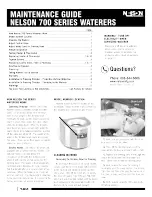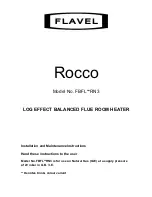
12
BURNER
Important:
Use only factory authorized replacement parts.
If you lack the necessary skills to properly perform the
installation, you should not proceed, but get help from a
quali
fi
ed service technician.
Tools required:
3/4” Open-End Wrench
Phillips Head Screwdriver
Ratchet with 1/4” socket or 1/4” nutdriver.
Removing Inner Door/Manifold/Burner Assembly:
Set the gas control valve/thermostat to its lowest
setting by turning the knob counter-clockwise to the
VAC point (see Figure 3).
Turn gas control switch to the “OFF” position and turn
“OFF” the gas supply to the unit (see Figure 3).
Disconnect the electrical power to the water heater
from the wall outlet.
Remove the outer door from the unit.
Unplug all the electrical connections from the bottom
of the gas control valve/thermostat (see Figure 15).
Using a 3/4” open end wrench remove the manifold
tube from the gas control valve/thermostat (turning
counter-clockwise for natural gas, clockwise for L.P.).
Grasp the manifold tube and push down slightly to
free the manifold tube from the gas control valve/
thermostat (see Figure 15).
Remove the insulation pad on the inner door by cutting
it if necessary. Keep the insulation in a safe place for
reusing it later.
Use a 1/4” nutdriver or 1/4” socket & ratchet to loosen
the 2 hex head screws on the inner door so the inner
door/manifold/burner assembly can be removed (see
Figure 15).
Remove inner door/manifold/burner assembly by
grasping the manifold, rotating it to the left to clear the
igniter and
fl
ame sensor and pulling back. Care should
be taken when inner door and burner assembly passes
through jacket opening that it does not damage any
of the electrical wiring (see Figure 17).
Removing Burner:
Burner may be hot. Wait until burner has cooled
off. After noting the position of the condensation
drain hole on the top of the burner, turn the inner
door/manifold/burner assembly upsidedown. Using
a Phillips head screwdriver, remove and retain the 2
screws attaching the burner to the manifold pipe (see
Figure 18 & 19).
Installing Burner:
Care MUST be taken to ensure the burner is installed
correctly on the inner door/manifold assembly. Position
the new burner upside down with the orientation of the
burner’s condensation drain as shown in illustration (see
Figure 18 & 19).
•
•
•
1.
2.
3.
4.
5.
6.
7.
8.
9.
1.
Align the screw holes on the inner door/manifold
assembly. Using the two screws removed in step 1
of Removing Burner, install the new burner to the
inner door/ manifold assembly (rotate the assembly to
visually check the top portion of the burner assembly
and con
fi
rm the orientation of the condensation drain
hole (see Figure 19 and note).
Caution Must Be Taken
Prior to installing the new inner door/manifold/burner
assembly, look inside the burner chamber to fully
understand the correct positioning of the burner assembly
and burner manifold tab. It may be necessary to use a
fl
ashlight to ensure correct placement. Care must be taken
so as to not damage any electrical wiring, or components
as you are installing the new inner door/manifold/burner
assembly. Extra caution should be taken to ensure that
electrical wiring,
fi
berglass insulation or any other object
is not between door gasket and combustion chamber
shield.
Note:
If the burner door gasket (see Figure 9) is
worn or damaged it needs to be replaced. See section
“Door Gasket Replacement”.
Reinstalling Inner Door/Manifold/Burner Assembly
Insert the manifold/burner assembly in the burner
chamber compartment, making sure that the tip of
burner manifold tab engages in the proper slot of the
bracket. The tip end of the burner manifold MUST be
placed in the slotted portion under the condensation
pan to obtain proper installation (see Figure 16).
Important:
•
The tip end of the burner manifold MUST be placed
in the
upper
slotted portion for models with input rate
of 40,000 to 50,000 Btu/hr to obtain proper installation.
• The tip end of the burner manifold MUST be
placed in the
lower
slotted portion for models with
input rate of 60,000 to 75,000 Btu/hr to obtain proper
installation.
After con
fi
rming no materials of any type are between
door gasket and combustion chamber shield, align
the screws on the inner door with the screw holes
on the combustion chamber and tighten with 1/4”
nutdriver or 1/4” socket & ratchet (see Figure 15).
After tightening the inner door screws, visually inspect
area around door gasket and skirt for spaces or
gaps. The door gasket MUST be sealed completely
in order for the water heater to perform properly.
DO NOT OPERATE THE WATER HEATER IF THE
DOOR GASKET DOES NOT CREATE A SEAL
BETWEEN MANIFOLD DOOR AND COMBUSTION
CHAMBER.
Reconnect the manifold tube to the gas control valve/
thermostat (
Note:
Do Not apply any thread sealant
at this connection). To prevent any cross threading
the manifold tube should be started by hand (turn
clockwise for natural gas, counter-clockwise for L.P.).
Upon tightening with the
fi
ngers and con
fi
rming it has
not been cross threaded, tighten nut with a 3/4” open
end wrench (see Figure 15).
1.
1.
2.
3.
BURNER AND ORIFICE REMOVAL/REPLACEMENT













































